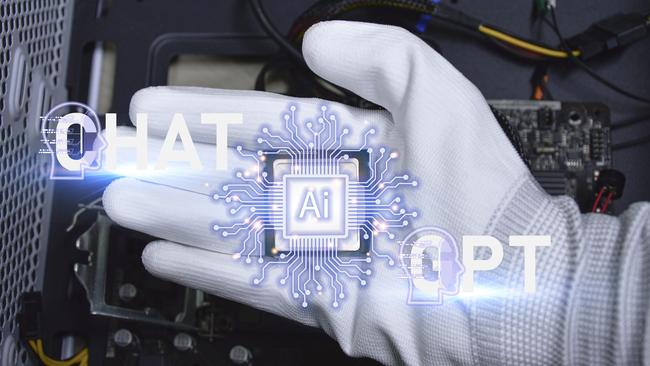ChatGPT sparks investment talk in AI and other technology stocks
After a torrid 2022, freefalling technology shares seem to have stabilised, but uncertainty clouds what comes next.

The ChatGPT artificial intelligence global juggernaut has added spice to the battered technology sector as more investors seek a slice of emerging industries.
After painful price falls for tech stocks last year, relative calm has emerged as the public and investors become seduced by AI’s potential, but high interest rates and high valuations continue to cloud the outlook.
ChatGPT, a popular chatbot built by private US company OpenAI, has quickly become the fastest-growing consumer application in history. While investors cannot buy into it, they can gain some exposure by owning shares in its key investor Microsoft or the broader AI sector through exchange traded funds.
CMC Markets director of stockbroking Andy Rogers said popular big-tech companies including Microsoft, Amazon and Google owner Alphabet had exposure to AI.
“ChatGPT has made the topic of AI tangible,” he said. “Up until that point, society was not really getting the power of what that technology can do. We haven’t seen driverless cars working at scale, but an everyday person has had a play-around with this thing.
“People are getting really excited, and that’s why we are seeing with our clients this rush towards these ETFs.”
Mr Rogers said most ETFs that focused purely on AI were based in the US but could be bought through online and full-service stockbrokers in Australia.
“People want exposure to the sector,” he says.
Baker Young analyst Toby Grimm said AI was a megatrend, but was not new.
“The biggest tech companies in the world are well and truly down the track,” he said. “There are enormous risks, but with that comes enormous potential.
“From an Australian market perspective the opportunities are more limited, but we do have some exposure.”
Appen is former Aussie market darling developing a language translation engine. “They have tens of thousands of people teaching computers about language,” Mr Grimm said.
However, Appen’s share price has tumbled more than 90 per cent since peaking in 2020
Mr Grimm said medical imaging company Pro Medicus was working on AI applications in its field, while LBT Innovations was bringing AI to microbiology.
“One reason why AI is so attractive to investors is the immensely wide scale of applications and potential market opportunities,” Mr Grimm said.
He said people could get exposure to AI developments through big tech or invest through an ETF. “There’s no way of knowing who will be the winners at the end of the day.”
Some Aussie tech companies are doing well. Logistics software giant WiseTech Global is trading at record highs, as is software group TechnologyOne.
In contrast, shares in network services provider Megaport have been sinking for 18 months, and lost 15 per cent in one day this week amid the unexplained shock resignation of its CEO.
Catapult Wealth portfolio manager Timothy Haselum said a small allocation to AI could be a good investment.

“AI is already here, but which company, and the timeline on return on investment are the variables,” he said. “This is a very fast-moving and changing sector. ChatGPT is in vogue today but who knows what will happen in five years’ time. The companies that use and benefit from AI technology can more easily chop and change options, which makes them the safer bet.”
Mr Haselum said some tech stocks had been beaten up, but that did not necessarily make them cheap.
“Some are in real trouble,” he said. “The global large caps look relatively more expensive, so there may be more value is the mid to smalls, but then you’re talking very high levels of risk.
“While some may look reasonable value, it’s the E (earnings) in the P/E (price-to-earnings) ratio that’s a worry in the next year or two.”
Mr Grimm was more positive and said technology companies now comprised 3 per cent of Australia’s stockmarket.
Share price stabilisation this year delivered some hope that prices would rise when interest rates started falling again, Mr Grimm said.
“There hasn’t really been the selling in the tech space that we saw in 2022,” he said.
“That gives us confidence about the long-term potential, and reflects the fact that large tech has inherently defensive characteristics in relatively low overheads and high profit margins that put it on the right side of inflation.”






To join the conversation, please log in. Don't have an account? Register
Join the conversation, you are commenting as Logout